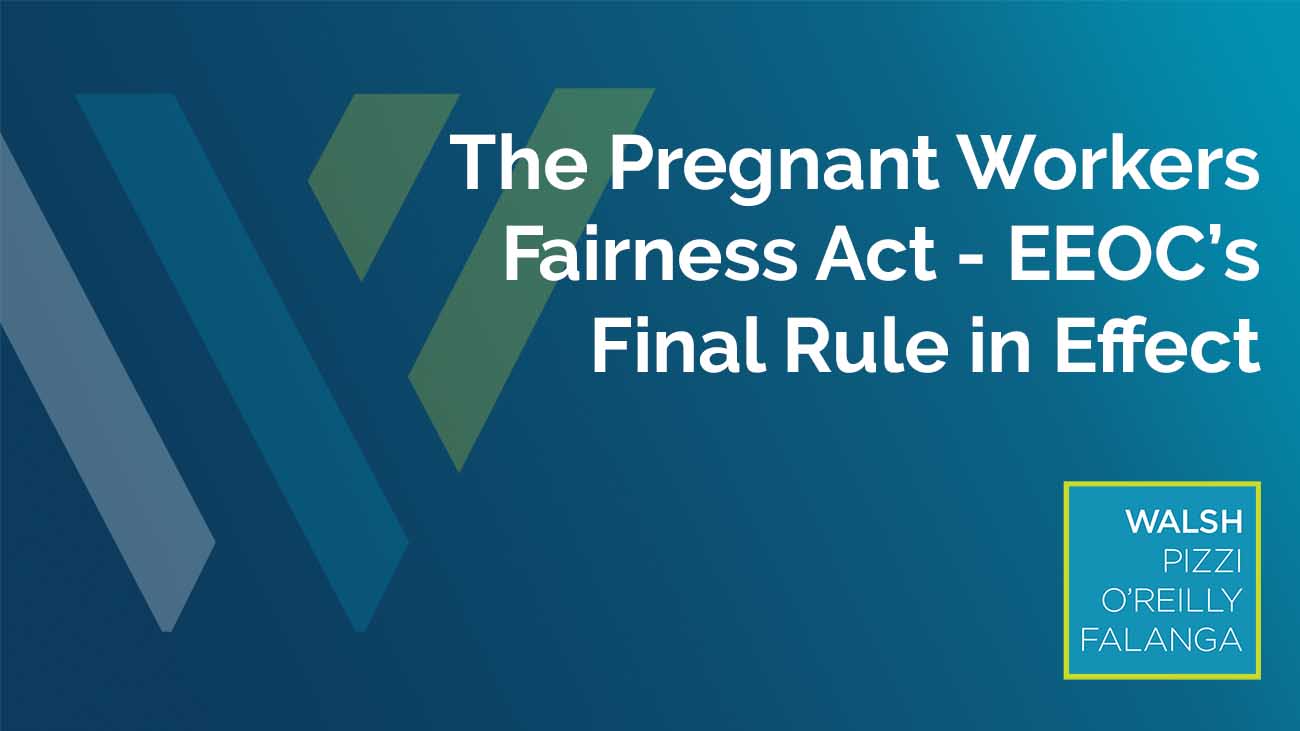
The Pregnant Workers Fairness Act – EEOC’s Final Rule in Effect
The Pregnant Workers Fairness Act (PWFA) requires the federal government, as well as certain private, state, and local employers, to provide “reasonable accommodations” to a qualified employee’s or applicant’s known limitations related to, affected by, or arising out of pregnancy, childbirth, or related medical conditions, unless the accommodation would cause the employer an “undue hardship.” The PWFA went into effect on June 27, 2023. After a notice and comment period, the EEOC issued its final regulations to carry out the law and provide clarity on its broad interpretation of the PWFA. The regulations went into effect on June 18, 2024. Under the new regulations, employers’ obligations are expansive and go beyond what the Americans with Disabilities Act (ADA) requires for disabilities.
Who Is Covered?
The PWFA covers employers (as well as unions and employment agencies), employees, applicants, and former employees who are currently covered by: (1) Title VII of the Civil Rights Act of 1964; (2) the Congressional Accountability Act of 1995 and 3 U.S.C. § 411(c); (3) the Government Employee Rights Act of 1991 (GERA); or (4) section 717(a) of Title VII, which covers federal employees. Whoever satisfies the definition of an “employer” or “employee” under any of these laws is an employer or employee for purposes of the PWFA.
What Limitations Must Be Accommodated?
Employees or applicants may seek reasonable accommodations regarding limitations and medical conditions, such as miscarriage or stillbirth, migraines, lactation, and other pregnancy-related conditions. Pregnancy and childbirth are defined broadly to include a current or past pregnancy, potential or intended pregnancy (such as infertility, fertility treatments, and the use of contraception), labor, and childbirth. An employee’s limitations need not be major or ongoing; minor and episodic needs and limitations must also be accommodated.
Examples of possible reasonable accommodations include:
- Additional breaks to drink water, eat, or use the restroom to accommodate fatigue or breastfeeding needs
- Time off for health care or prenatal care appointments
- Time off to recover from childbirth or a miscarriage
- Temporary reassignment to alternate locations to reduce work commute
- Temporary suspension of certain job duties
- Telework to minimize risk of diseases
- Modification of equipment, uniforms, or devices
When Does an Employer Become Obligated to Offer Accommodations?
Once an employee makes “known” to their supervisor that they have a limitation related to pregnancy, childbirth, or a related medical condition and need a change in how they work, the employer is obligated to either provide an effective accommodation or communicate with the employee to identify one. An employee does not have to mention the law by name. Rather, an employee may simply voice a concern to trigger the obligation to accommodate. When considering the potential accommodations that can be provided, the new regulations only allow employers to request “reasonable documentation” for such requests when it is “reasonable under the circumstances.”
What Constitutes an “Undue Hardship”?
An employer may consider multiple factors to determine whether an accommodation would impose an undue hardship on an employer and its business. According to the EEOC’s regulations, these factors can include:
- The length of time that the employee will be unable to perform the essential function(s)
- Whether there is work for the employee to accomplish
- The nature of the essential function, including its frequency
- Whether the employer has provided other employees in similar positions who are unable to perform the essential function(s) of their positions with temporary suspensions of those functions and other duties
- Whether there are other employees, temporary employees, or third parties who can perform or be temporarily hired to perform the essential function(s) in question
- Whether the essential function(s) can be postponed or remain unperformed for any length of time and, if so, for how long
If an employer concludes the requested accommodation is unduly difficult or expensive, then that employer must work with the employee to try to reach an alternate solution.
What Should Employers Do Now?
Employers should ensure their workplace policies and procedures comply with the PWFA and the EEOC’s new guidance:
-
- Employers should ensure that supervisors and managers are properly trained on the PWFA and the interactive process so that they know how to respond to a request for an accommodation.
- Managers should be prepared to understand the rights of applicants and workers who are pregnant, trying to become pregnant, recently gave birth, or who have miscarried.
- Employers must avoid retaliating against those who request a reasonable accommodation. The PWFA retaliation provision shares the protections and damages provisions under the Americans with Disabilities Act and Title VII.
- Management should also be made aware that the PWFA does not replace federal, state, or local laws that are more protective of workers affected by pregnancy, childbirth, or related medical conditions. For example, New York recently implemented paid leave for pregnant employees to attend doctors’ appointments, thereby expanding its paid sick time requirements up to an additional 20 hours. And New Jersey employers are already subject to the provisions and obligations of N.J.S.A. 10:5-12(s).
For any questions on the new pregnancy-related laws and regulations, or to discuss strategies for accommodating pregnant workers, please contact Walsh’s Labor & Employment law practice group.
This article was authored by Walsh Pizzi O’Reilly Falanga LLP Summer Associate and Fordham University School of Law J.D. Candidate, Alexandra Arleo.

